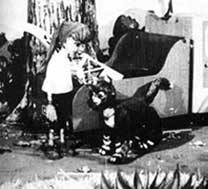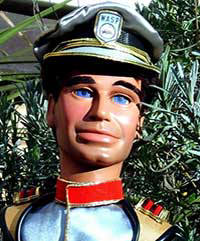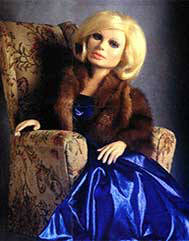
History
Others
Puppets



This website is the copyright of Benjamin Burford-Jones 2014, except quotations and photographs used to illustrate various traditional and television puppets.
No material should be reproduced in any form whatsoever for purposes of commercial gain without obtaining the copyright holder’s express permission.
Back in 1958, fledgling company AP Films had an ambition to make a movie epic. But there was a problem - they had a bank balance of only £500 and a warehouse soundproofed with 1,500 empty egg boxes nailed to the walls. What the owners, Arthur Provis and Gerry Anderson, finally produced was a children's puppet programme, The Adventures of Twizzle - a yarn about a boy who could stretch his limbs to impossibly long lengths. The puppets were primitive marionettes, with jerky movements, filmed in front of crude painted backdrops. One time AP Films employee and ex-wife of Gerry, Sylvia Anderson recalls, 'we did not all dote on puppets as children and have puppet theatre: the raw truth is that we needed the work and that is all there was on offer.' It was, however, the humble beginnings of a legend in the annuals of television history.
As it was the only opportunity available at the time, Gerry Anderson continued with puppets and in 1960 he had a breakthrough with his Western production, Four Feather Falls. The strings were now only 1/5000th of an inch thick, and no longer as intrusive as the old Muffin the Mule wires. That was not the only advance. The mouths of the puppets were now electronically synchronised with the actors' voices. The result was a more realistic puppet adventure - the start of many that would amaze the world.
Although Four Feather Falls was a success, Granada who aired the series, declined to take up on more episodes after the first series. It was in their eyes only a children's show, and they believed they could save money by simply repeating rather than paying for more to be made. Just as AP Films was about to go under, forward thinking Lew Grade of ATV saw the potential of Gerry Anderson's creations. He immediately commissioned a new puppet series to be made.
Now that the company was fully immersed into the world of puppetry, they soon realised that there were many advantages over producing programmes with live actors and full-sized sets. Since the characters were small, and the locations were whatever could be built in the studio, the stories could be set anywhere or at any time. To embrace the newly developed puppetry methods that were being pioneered a new term was coined - 'Supermarionation'. This phrase was, in the words of Sylvia Anderson, to 'distinguish the pure puppetry of the stage from our more sophisticated filmed-television version.' As the era of flowerpower, peace and permissiveness drew ever closer, more puppet shows were produced. In the age of the space race, the formula of science fiction now became the central pivot. Fireball XL5, featuring the space travels of Steve Zodiac and his crew in the year 2063 proved popular, with excellent sales to foreign stations. The aquatic adventure Stingray was next, and has the privilege of being the first ever British series to be shot in colour. But it was the antics of International Rescue in Thunderbirds that truly caught the imagination of the masses. Keeping in with the sci-fi theme, Thunderbirds was set 100 years into the future and followed the exploits of the Tracy family and their top-secret organisation International Rescue. From their hidden island base, Jeff Tracy and his sons used technologically advanced air, sea, land and space vehicles to rescue people who were in mortal danger.
Thunderbirds has today grown into cult viewing, attracting audiences of all ages and backgrounds. So what is the appeal to adults for what, after all, is a child's show? Is it due to nostalgia, looking back through rose tinted glasses to those shows watched religiously as a child? There is at least some truth in this theory. Sylvia Anderson pondered that 'Thunderbirds is more than just a success story relating to a pioneering concept, but rather, like The Beatles, it represents a landmark in the lives of many people who were growing up in that era.' Thunderbirds certainly holds the old fashioned charm of many spy and adventure series from the sixties. The era of their production was one of the most fertile soils for ground breaking ideas and fashions. Many of these were incorporated into the programme, such as the character Lady Penelope's feminist action, almost akin to the popular Emma Peel of The Avengers, but without the kinky connotations or the martial art. The Gerry Anderson shows declined to break down the class barriers, or to engage in drugs, sex and rock 'n' roll. It was still at heart a kiddie's show and had certain principles to keep. Principles that the rest of the country were breaking at an amazing rate. Thunderbirds never offended, therefore the parents never took a bad attitude towards the show, and the press rarely hounded them. Those that saw it at the time tend to remember the adventurous antics of International Rescue with affectation, and when they tune in today it is often to relive a point in their past, perhaps recalling their childhood. Sylvia continues, 'some of its cultural impact has endured over the years and has been taken up by younger generations.' Certainly the gripping stories and action will still appeal to children in today's modern world. Since there is nothing like the Gerry Anderson shows in production now, children may look upon them as fresh and new, or perhaps if they are aware of its past, as how the sixties used to be.
Nostalgia cannot, however, be the one and only reason for the adult enjoyment of Thunderbirds. Back during its original run, the show was obtaining a high portion of avid adult followers. Indeed many famous names are known to be Thunderbirds fans - Roger Daltery, The Bee Gees, Prince Charles and The Rolling Stones to name but a few. When the show was first aired, these people were certainly not children. There must, therefore, be an appeal that is not nostalgia. Cliff Richard, the clean man of the pop world, helps make this appeal clearer, 'Thunderbirds was well ahead of its time. Although in no way cynical and only intended as sci-fi fun, the puppets were surely forerunners of today's high-tech wizardry.'
The puppets themselves must be the overwhelming reason for adults to tune into the Gerry Anderson shows. Thunderbirds was indeed revolutionary in puppetry, pushing forward model and miniature effects at a fast rate. Viewers could tune in for escapism from the harsh realities of everyday life, enjoying the programme as light- hearted entertainment, with the amazing technological effects to be admired and gasped at. In today's light, Gerry Anderson's shows may not look technologically perfect, but in the decade of their production nothing could touch them. With their success, the Supermarionation programmes cleared the way for puppet shows that no longer would be aimed purely at the child, but instead would embrace the complete family. Thunderbirds definitely were go!
Gerry Anderson
Troy Tempest From Stingray (Left)
The Adventures of Twizzle (Above)
Thunderbird's Lady Penelope (Right)



Herb the Owl | Alex the Droog | What is a Puppet | Watching With Mother | Gerry Anderson | Jim Hensons Muppets
From Satire to Sitcom | Are Puppets Just for Kids | About the Author and Links















